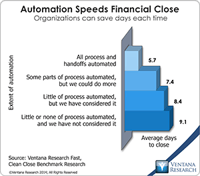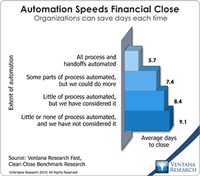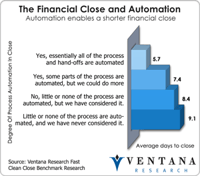Workiva’s Wdesk, a cloud-based productivity application for handling composite documents, will have a larger role to play as companies adopt new revenue recognition standards governing accounting for contracts. The Financial Accounting Standards Board (FASB), which administers Generally Accepted Accounting Principles in the U.S. (US-GAAP), has issued ASC 606 and the International Accounting Standards Board (IASB), which administers International Financial Reporting Standards (IFRS) used in most...
Read More
Topics:
close,
closing,
XBRL,
CFO,
Document Management,
SEC,
Composite document,
10K
Tagetik provides financial performance management software. One particularly useful aspect of its suite is the Collaborative Disclosure Management (CDM). CDM addresses an important need in finance departments, which routinely generate highly formatted documents that combine words and numbers. Often these documents are assembled by contributors outside of the finance department; human resources, facilities, legal and corporate groups are the most common. The data used in these reports almost...
Read More
Topics:
Big Data,
Mobile,
ERP,
Human Capital Management,
Modeling,
Office of Finance,
Reporting,
Budgeting,
close,
closing,
Consolidation,
Controller,
Finance Financial Applications Financial Close,
IFRS,
XBRL,
Analytics,
Business Analytics,
Business Intelligence,
Governance, Risk & Compliance (GRC),
Business Performance Management (BPM),
CFO,
compliance,
Data,
Financial Performance Management (FPM),
benchmark,
Financial Performance Management,
financial reporting,
FPM,
GAAP,
Integrated Business Planning,
Profitability,
SEC Software
Reconciling accounts at the end of a period is one of those mundane finance department tasks that are ripe for automation. Reconciliation is the process of comparing account data (at the balance or item level) that exists either in two accounting systems or in an accounting system and somewhere else (such as in a spreadsheet or on paper). The purpose of the reconciling process is to identify things that don’t match (as they must in double-entry bookkeeping systems) and then assess the nature...
Read More
Topics:
Office of Finance,
automation,
close,
closing,
Consolidation,
Controller,
effectiveness,
Reconciliation,
XBRL,
Governance, Risk & Compliance (GRC),
Business Performance Management (BPM),
CFO,
Data,
Document Management,
Financial Performance Management (FPM),
Financial Performance Management,
FPM
Oracle continues to enrich the capabilities of its Hyperion suite of applications that support the finance function, but I wonder if that will be enough to sustain its market share and new generation of expectations. At the recent Oracle OpenWorld these new features were on display, and spokespeople described how the company will be transitioning its software to cloud deployment. Our 2013 Financial Performance Management Value (FPM) Index rates Oracle Hyperion a Warm vendor in my analysis,...
Read More
Topics:
Big Data,
Mobile,
Planning,
Social Media,
ERP,
Human Capital Management,
Modeling,
Office of Finance,
Reporting,
Budgeting,
close,
closing,
Consolidation,
Controller,
driver-based,
Finance Financial Applications Financial Close,
Hyperion,
IFRS,
Tax,
XBRL,
Analytics,
Business Analytics,
Business Intelligence,
CIO,
Cloud Computing,
In-memory,
Oracle,
Business Performance Management (BPM),
CFO,
compliance,
Data,
Financial Performance Management (FPM),
benchmark,
Financial Performance Management,
financial reporting,
FPM,
GAAP,
Integrated Business Planning,
Price Optimization,
Profitability,
SEC Software
I recently attended Vision 2013, IBM’s annual conference for users of its financial governance, risk management and sales performance management software. These three groups have little in common operationally, but they share software infrastructure needs and basic supporting software components such as reporting and analytics. Moreover, while some other major vendors’ user group meetings concentrate on IT departments, Vision focuses on business users and their needs, which is a welcome...
Read More
Topics:
Planning,
Reporting,
Budgeting,
closing,
XBRL,
Analytics,
Data Management,
IBM,
Business Performance Management (BPM),
CFO,
Financial Performance Management (FPM),
Financial Performance Management,
FPM,
SEC,
TM1,
Digital Technology
The International Integrated Reporting Council (IIRC) recently published a draft framework outlining how it believes businesses ought to communicate with their stakeholders. In this context the purpose of an “integrated report” is to promote corporate transparency by clearly and concisely presenting how an organization’s strategy, governance, and financial and operational performance will create value for shareholders and other stakeholders in both the short and the long term. Such a report...
Read More
Topics:
Sustainability,
Office of Finance,
closing,
XBRL,
Business Analytics,
Business Intelligence,
Information Applications (IA),
Information Management (IM),
financial reporting,
FPM,
SASB,
SEC
This is annual report season, the time of year that a majority of European and North American corporations issue glossy paper documents aimed at investors, customers, suppliers, existing and prospective employees as well as the public at large. (Some countries have different conventions; in Japan, for instance, most companies are on a March fiscal year.) In reviewing some of the annual reports that are available on the Web, I was struck by the absence of advanced reporting technology used on...
Read More
Topics:
Office of Finance,
extended close,
US-GAAP,
XBRL,
Analytics,
Governance, Risk & Compliance (GRC),
Business Performance Management (BPM),
CFO,
compliance,
Financial Performance Management (FPM),
financial reporting,
SEC,
Digital Technology
I’m wondering whether the rapid rise in earnings restatements by “accelerated filers” (companies that file their financial statements with the U.S. Securities and Exchange Commission that have a public float greater than $75 million) over the past three years is a significant trend or an interesting blip. According to a research firm, Audit Analytics, that number has grown from 153 restatements in 2009 to 245 in 2012, a 60 percent increase. What makes it a blip is that the total is still less...
Read More
Topics:
Customer Experience,
Governance,
GRC,
Office of Finance,
Reporting,
audit,
close,
Consolidation,
Controller,
Tax,
XBRL,
Governance, Risk & Compliance (GRC),
Business Performance Management (BPM),
CFO,
compliance,
Financial Performance Management (FPM),
FPM,
SEC
I was discussing the United States Securities and Exchange Commission’s (SEC) eXtensible Business Reporting Language (XBRL) mandate with a former head of investor relations at a Fortune 100 company. His take on it is much the same as that of everyone else involved with corporate reporting: it doesn’t produce much value and costs a bundle to comply. I related to him my thoughts on the lack of progress I saw in making the XBRL mandate more useful to corporations and investors alike. Making XBRL...
Read More
Topics:
Office of Finance,
Reporting,
extended close,
US-GAAP,
XBRL,
Analytics,
Business Performance Management (BPM),
CFO,
compliance,
Financial Performance Management (FPM),
financial reporting,
FPM,
SEC,
Digital Technology
Read More
Topics:
Office of Finance,
extended close,
US-GAAP,
XBRL,
Analytics,
Governance, Risk & Compliance (GRC),
Business Performance Management (BPM),
CFO,
compliance,
Financial Performance Management (FPM),
financial reporting,
SEC,
Digital Technology

















